
| Centre Name: | 
Centre for Internet of Things and Big Data (CIoTBD) (http://ciotbd.research.utar.edu.my/) |
| Chairperson: | Dr. Ng Hui Fuang |
| Description of Centre: | Centre for IoT & Big Data (CIoTBD) aims to provide a focal point of contact for management, cooperation and coordination among UTAR staffs and external parties that seek R&D collaboration and consultancy. The vision of this centre is to become a national and regional centre of excellence in the research areas of technologies especially in Internet of things and big data. |
| Research area: |
The centre has research projects on the following areas of interest:
|
| No. | Name | Faculty | Member |
|---|---|---|---|
| 1 | Aamir Amin | FICT | Full Membership |
| 2 | Aun Yichiet | FICT | Full Membership |
| 3 | Ch'ng Chee Henn | FICT | Full Membership |
| 4 | Chai Meei Tyng | FICT | Full Membership |
| 5 | Chan Lee Kwun | FICT | Full Membership |
| 6 | Chang Jing Jing | FICT | Full Membership |
| 7 | Cheng Wai Khuen | FICT | Full Membership |
| 8 | Deveendra menon a/l Narayanan Nair | FICT | Full Membership |
| 9 | Gan Ming Lee | FICT | Full Membership |
| 10 | Goh Chuan Meng | FICT | Full Membership |
| 11 | Goh Hock Guan | FICT | Full Membership |
| 12 | Jasmina Khaw Yen Min | FICT | Full Membership |
| 13 | Jason Lim Jing Wei | FICT | Full Membership |
| 14 | Kesavan Krishnan | FICT | Full Membership |
| 15 | Khor Siak Wang | FICT | Full Membership |
| 16 | Ku Chin Soon | FICT | Full Membership |
| 17 | Lai Siew Cheng | FICT | Full Membership |
| 18 | Lee Heng Yew | FICT | Full Membership |
| 19 | Leong Chun Farn | FICT | Full Membership |
| 20 | Leung Kar Hang | FICT | Full Membership |
| 21 | Liew Soung Yue | FICT | Full Membership |
| 22 | Lim Seng Poh | FICT | Associate Membership |
| 23 | Mobashar Rehman | FICT | Full Membership |
| 24 | Mogana a/p Vadiveloo | FICT | Full Membership |
| 25 | Mok Kai Ming | FICT | Full Membership |
| 26 | Ng Hui Fuang | FICT | Full Membership |
| 27 | Ng Wan Qing | FICT | Full Membership |
| 28 | Nor Fatiha Binti Subri | FICT | Full Membership |
| 29 | Norazira binti A Jalil | FICT | Full Membership |
| 30 | Nur Syadhila Binti Che Lah | FICT | Full Membership |
| 31 | Ooi Boon Yaik | FICT | Full Membership |
| 32 | Ooi Chek Yee | FICT | Full Membership |
| 33 | Ooi Joo On | FICT | Full Membership |
| 34 | Phan Koo Yuen | FICT | Full Membership |
| 35 | Ramesh Kumar Ayyasamy | FICT | Full Membership |
| 36 | Rehan Akbar | FICT | Full Membership |
| 37 | Robithoh Annur | FICT | Full Membership |
| 38 | Saw Seow Hui | FICT | Full Membership |
| 39 | Sayed Ahmad Zikri Bin Sayed Aluwee | FICT | Full Membership |
| 40 | Soong Hoong Cheng | FICT | Full Membership |
| 41 | Su Lee Seng | FICT | Full Membership |
| 42 | Sun Teik Heng @ San Teik Heng | FICT | Full Membership |
| 43 | Syed Muhammad Bin Syed Omar | FICT | Full Membership |
| 44 | Mr Tan Chiang Kang @ Thang Chiang Kang | FICT | Full Membership |
| 45 | Tan Hung Khoon | FICT | Full Membership |
| 46 | Tan Joi San | FICT | Full Membership |
| 47 | Tan Lyk Yin | FICT | Full Membership |
| 48 | Tan Teik Boon | FICT | Full Membership |
| 49 | Teoh Shen Khang | FICT | Full Membership |
| 50 | Tey Chee Chieh | FICT | Full Membership |
| 51 | Tong Dong Ling | FICT | Full Membership |
| 52 | Tou Jing Yi | FICT | Full Membership |
| 53 | Tse Siu Hong Savio | FICT | Full Membership |
| 54 | Vasaki a/p Ponnusamy | FICT | Full Membership |
| 55 | Wan Aida Nadia Binti Wan Abdullah | FICT | Full Membership |
| No. | Date | Type | Event |
|---|---|---|---|
| 1 | 17 January 2020 | Forum | Precision Agriculture: Digital Farming, Horticulture Applications & Forestry |
| 2 | 17 February 2020 | Forum | Dr Mantis Cheng’s experience in design and analysis of real time and embedded systems. |
| 3 | 4 March 2020 | Forum | Research in Applied Instrumentation and Measurement |
| 4 | 12 June 2020 | Forum | The MESH vs The CAD |
| 5 | 22 July 2020 | Forum | Front Yard Robbery / Theft Detection based on Human Behaviors and Yard Layout |
| 6 | 25 August 2020 | Forum | Demo on TidyModels |
| 7 | 22 September 2020 | Forum | FICT External Examiner Prof Dr Paul Roe's R & D research experience sharing and sharing session |
| 8 | 10 October 2020 | Forum | An energy-efficient Path-finding Strategy for Mobile Sink in Air-Ground Collaborative Wireless Sensor Networks |
| 9 | 11 December 2020 | Forum | Course Map and Research Areas/Topics in Computer Science & Information Engineering at NCKU, Taiwan |
| 10 | 11 December 2020 | Colloquium | FICT Postgraduate Colloquium 2020 |
| No. | Date | |
|---|---|---|
| 1 | Precision Agriculture: Digital Farming, Horticulture Applications & Forestry Date: 17 January, 2020 Time: 10:30pm – 11:30pm Event Type: Forum Venue: N109, Block N, FICT, UTAR (Kampar Campus) Speaker: Ts Dr Goh Hock Guan #Participants: 17 This sharing talked about the precision technologies that are used in New Zealand. The sharing includes the end-to-end technologies used for Kiwi (farming, machine, testing, tagging, research etc) and forestry (hyperspectral, LiDAR, etc) application. The video as in this link, https://www.youtube.com/watch?v=HgcwuH5xotY. |

|
| 2 | Dr Mantis Cheng’s experience in design and analysis of real time and embedded systems. Date: 17 February, 2020 Time: 1:00 pm – 2:00pm Event Type: Forum Venue: N109, Block N, FICT, UTAR (Kampar Campus) Speaker: Dr Mantis Cheng #Participants: 16 Dr Mantis Cheng completed my Ph.D. at the University of Waterloo, Canada in 1987. Since then, he joined the Department of Computer Science, University of Victoria, Canada in 1988 and have been teaching there for 31 years now. He have taught both theory and systems courses. Theory courses cover topics in Programming Languages and Concurrency Theories; systems courses cover topics in Operating Systems, and Real Time Embedded Systems. My primary research interests are about implementing and verifying distributed real time systems. (See: http://webhome.csc.uvic.ca/~mcheng/research/index.html) He worked closely with NORTEL (Northern Telecomm) for many years since the early 90's. My industrial experiences had given me valuable insight on how to use practical problems in classrooms. Over the past 30 years teaching at the University of Victoria, he have established two laboratories for teaching. Many of my courses involved hands-on projects that deal with real world problems. He have designed and built several embedded real time operating systems to be used in my courses. He encourages students to try new solutions to solve difficult engineering problems. In his opinion, learning from mistakes plays an important role in the early development of critical thinking and creative problem solving. His belief is that learning-by-doing, instead of learning-by-reading alone, promotes self-motivated and peer-to-peer learning. Students will never forget their engineering process, particularly after many painstaking hours of trouble-shooting and failed attempts. This is, what he views, one of the most important part of laboratory team-based project learning— identifying what works and what doesn't work, and why. Two courses at UVic that he taught the most often are: 1) Design and Analysis of Real Time Systems, and 2) Software for Embedded and Mechatronics Systems. He created many projects for students in these two courses. Some of them are documented here: http://webhome.csc.uvic.ca/~mcheng/samples/demos/Home.html. |
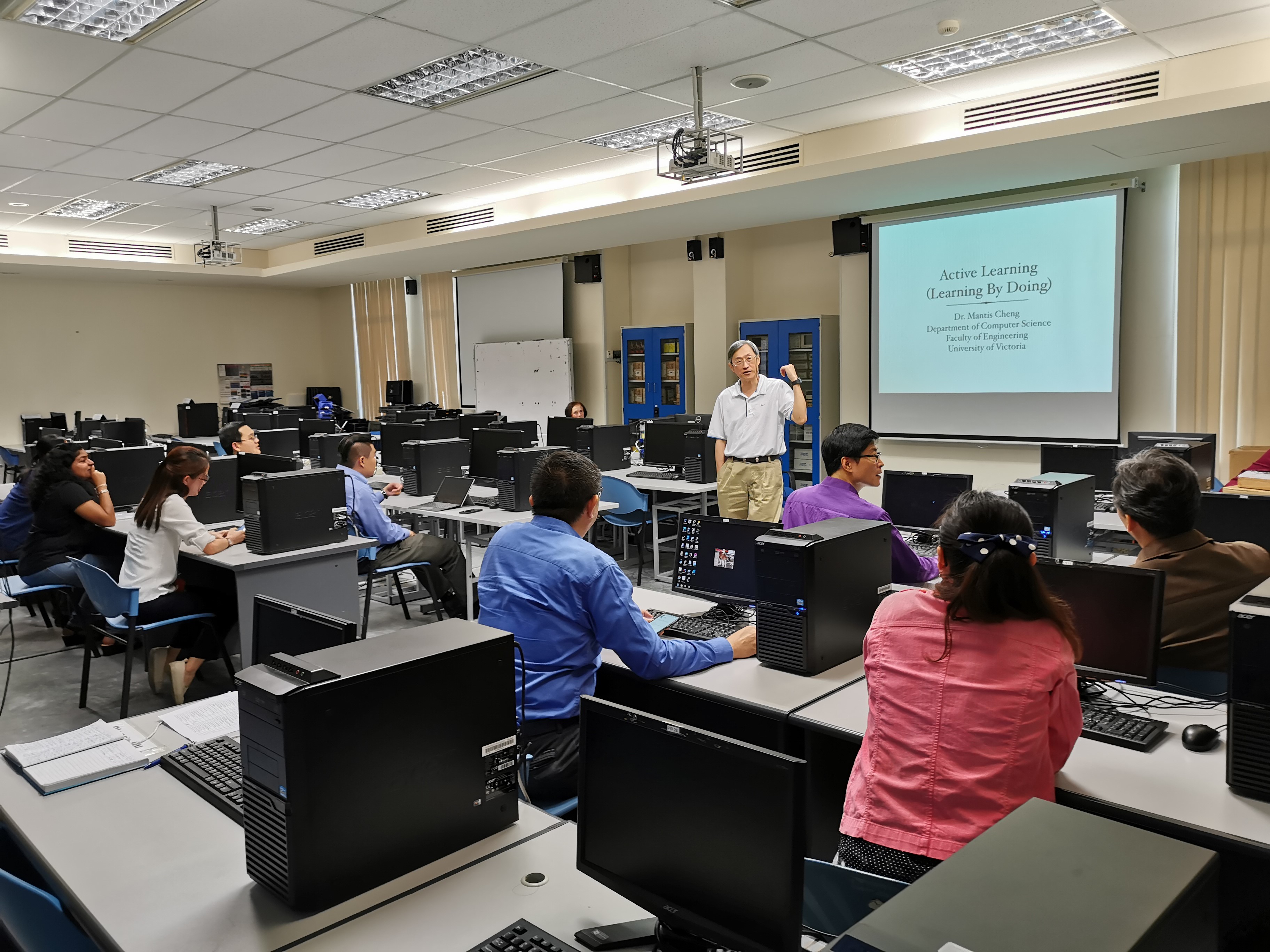
|
| 3 | Research in Applied Instrumentation and Measurement Date: 4 March, 2020 Time: 2:30 pm - 3:30 pm Event Type: Forum Venue: N109, Block N, FICT, UTAR (Kampar Campus) Speaker: Prof Shervin #Participants: 9 Instrumentation and Measurement (I&M) is a fundamental component of all science and engineering disciplines. After all, as Lord Kelvin said in the late 1800s, “To measure is to know.” Yet many researchers don’t know what I&M means as a research field, or how to apply it properly in their own field. In this talk, after presenting some general information about University research and publication, we will go over both basic and applied I&M, with examples in IoT, AI, and Multimedia Systems/Networks. |

|
| 4 | The MESH vs The CAD Date: 12 June, 2020 Time: 11:00 am - 12:00 pm Event Type: Forum Platform: Zoom Speaker: Ts Saw Seow Hui #Participants: 26 “3D Mesh” has always been an important jargon in my research dictionary. Nevertheless, Ms Saw was startled by the reviewers from ACM Transactions of Graphics who have used the term “CAD model”, instead of what she has used thus far. Hence, this has induced her interest into looking for the differences between utilizing these two terms: “3D Mesh” and “CAD Model”, into her research writing. |

|
| 5 | 5. Front Yard Robbery / Theft Detection based on Human Behaviors and Yard Layout Date: 22 July, 2020 Time: 10:00 am - 11:00 am Event Type: Forum Platform: Ms Teams Speaker: Prof Leung Kar Hang #Participants: 16 In 2019, Numbeo revealed that Malaysia was ranked with the highest crime rate among other Southeast Asia countries with crime index of 60.79%. This indicates that the occurrences of crime are quite frequent. The common crimes that happen in residential neighbourhoods are robbery and theft. Most of the residential neighbourhoods are vulnerable to violation due to lack of reliable security. This UTARRF work aims to develop an intelligent surveillance system that can recognize the characteristics of robbery and theft occurring in the front yard of a landed house using a security camera positioned at the place of interest. The objective is to build prototypes to detect two different robbery/ theft senarios to demonstrate feasibility of the proposed. |
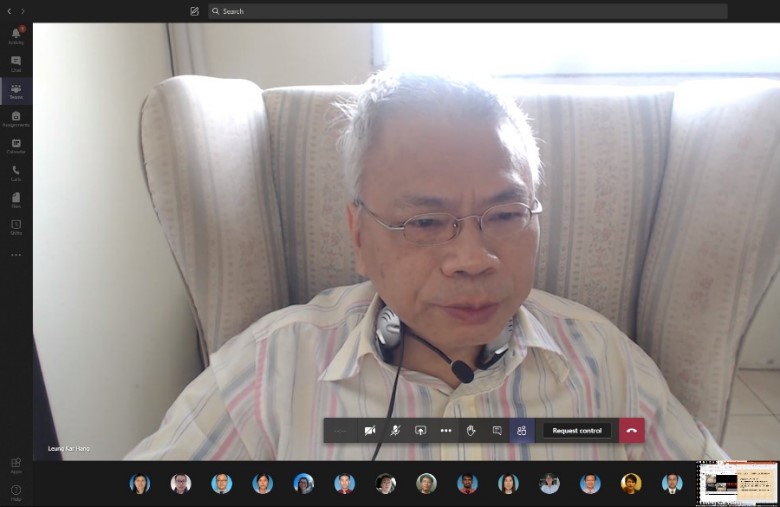
|
| 6 | Demo on TidyModels Date: 25 August, 2020 Time: 10:00 am - 11:00 am Event Type: Forum Platform: Zoom Speaker: Dr. Pradeep #Participants: 14 The tidyverse is a collection of R packages designed for data science with the same underlying design philosophy, grammar, and data structures. In this webinar, tidymodels will be demonstrated. The tidymodels framework is a collection of R packages for machine learning using tidyverse principles. |
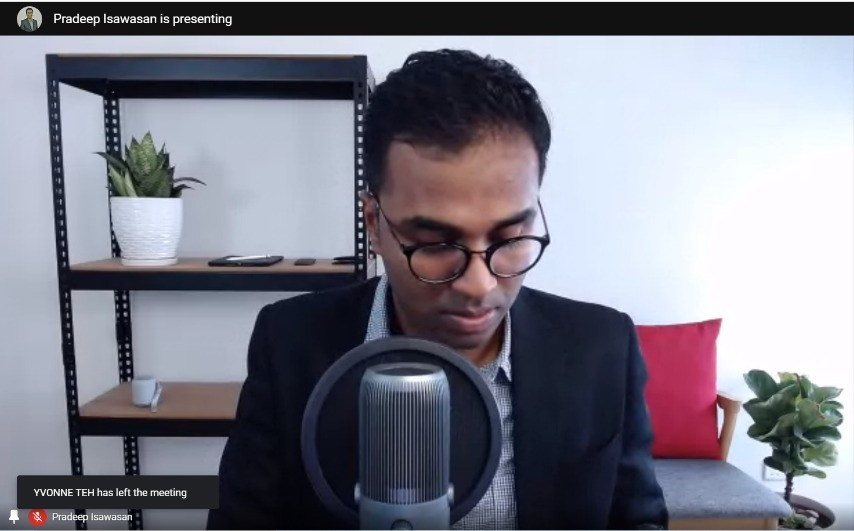
|
| 7 | FICT External Examiner Prof Dr Paul Roe's R & D research experience sharing and sharing session Date: 22 September, 2020 Time: 10:00 am - 11:00 am Event Type: Forum Platform: Zoom Speaker: Professor Dr Paul Roe #Participants: 27 Prof Dr Paul Roe's profile information can obtained from Queensland University of Technology website: https://staff.qut.edu.au/staff/p.roe |
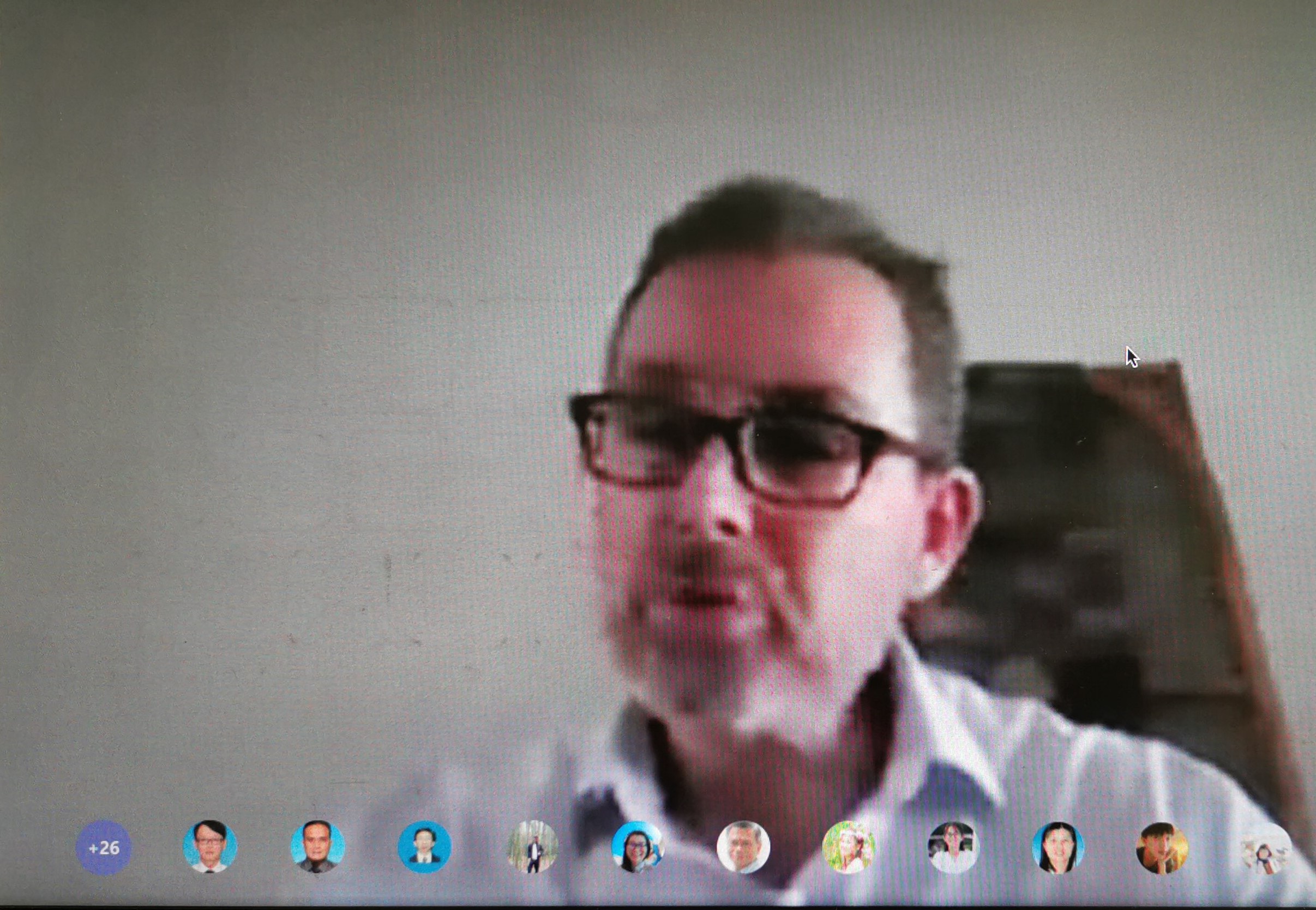
|
| 8 | An energy-efficient Path-finding Strategy for Mobile Sink in Air-Ground Collaborative Wireless Sensor Networks Date: 30 October, 2020 Time: 11:00 am - 12:00 pm Event Type: Forum Platform: Zoom Speaker: Ms. Tan Lyk Yin #Participants: 26 Data collection using a mobile sink in a Wireless Sensor Network (WSN) has received much attention in ecent years owing to its potential to reduce the energy consumption of sensor nodes and thus enhancing the lifetime of the WSN. However, a critical issue of this approach is the latency of data to reach the base station. Although many data collection algorithms have been introduced in the literature to reduce delays in data delivery, their performances are affected by the flight trajectory taken by the mobile sink, which might not be optimized yet. This paper proposes a new path-finding strategy, called Energy-efficiency Pathfinding Strategy (EPS) in the Air-Ground Collaborative Wireless Sensor Network (AGCWSN). The proposed approach is able to greatly enhance the efficiency of data collection. The performance of the proposed strategy is simulated and compared with the existing strategies over several parameters. The simulation results show that the mobile sink with EPS can collects data with lower data delivery delay as compared to other existing strategies. The number of data retransmissions between sensor nodes and mobile sink in EPS is also the lowest in EPS among several existing strategies. The data delivery delay is 66% and 120% lower than Rest Center Tractor Scanning (RCTS) and Non-stop Center Tractor Scanning (NCTS) in irregular and grid topology respectively. The data delivery delay is 62% lower than Two Row Scanning (TRS) in grid topology and 120% lower than RkM in irregular topology. The packet loss of EPS-2 is 1.3% lower than RkM. |
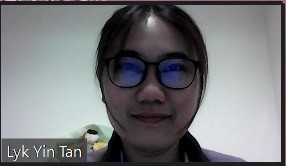
|
| 9 | Design and Design Automation of Microsystems Date: 11 December, 2020 Time: 9:00 am - 10:00 am Event Type: Forum Platform: Zoom Keynote Speaker: Prof Lihong Zhang #Participants: 47 Since many of new integrated circuits (ICs) need to directly interact with the external continuous-valued world, analog circuits have become an indispensable component in the modern system-on-chips. The digital part of mixed-signal designs can be tackled by using cell-based tools for synthesis, mapping, and physical design. The analog portion, however, is still routinely designed by hand or poorly supported by computer-aided design (CAD) tools. Moreover, unlike digital circuits aided by available intellectual properties (IPs), analog counterparts have to be manually redesigned as a given chip migrates from one fabrication process to another (process migration) or from one set of performance specifications to another (performance retargeting). In this technical talk, a survey on analog and radio frequency (RF) automated layout generation methodologies is first given. The manufacturability challenges imposed by the advanced technologies are also discussed. The talk is focused on some new research results of innovative template-based symbolic layout retargeting and optimization methodologies for process migration and performance retargeting. Some design-for-manufacturability (DFM) techniques are considered in the automated layout retargeting process. The talk also encloses some discussion of microelectromechanical systems (MEMS) design and design automation for vibration-based piezoelectric energy harvesting. New research thrusts will be also presented at the end of the talk. |
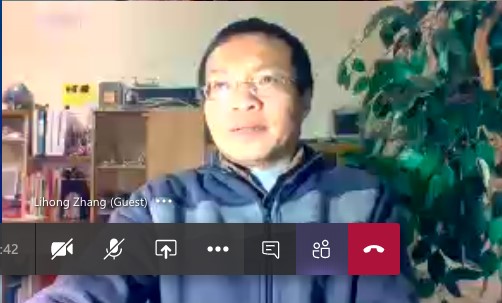
|
| 10 | FICT Postgraduate Colloquium 2020 Date: 11 December, 2020 Time: 10:00 am - 12:00 pm Event Type: The FICT Postgraduate Colloquium Platform: Ms Teams Speakers: Postgraduates Presentations #Participants: 34 CIoTBD and FICT have organized FICT Colloquium of the year on 11th December, 2020. In this colloquium, all postgraduate students (both Master and PhD students) presented their recent work or findings in their field of research. This activity provides a chance to all postgraduate students of FICT to exchange ideas and gather feedback on their research progress and findings. Through this interaction, students will gain exposure on different fields of research undertaken by students in the faculty. It also serves as a platform for supervisors and evaluators to gauge the performance of postgraduate students before submitting the research progress report. The FICT Colloquium has three parallel tracks. There were a total of 18 postgraduate presentations, grouped into 3 sessions, namely Communication, Networking, Security; Artificial Intelligence; Information Systems and Software Technologies. Each student delivered a 15-to-20-minute presentation, followed by 10 to 15 minutes of Q&A. The programme for the colloquium is given below. 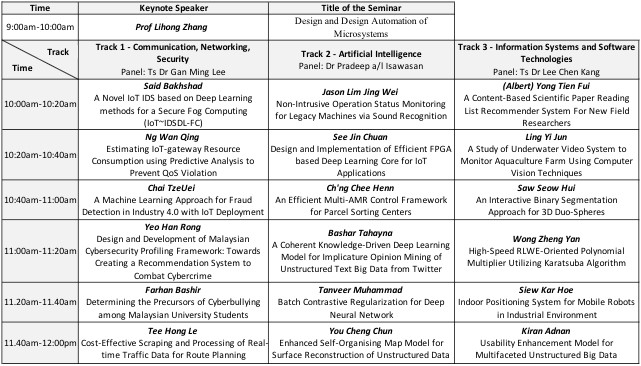
|

|